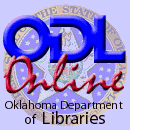

 |
 |
 |
|

2007 Oklahoma Book Award Winners

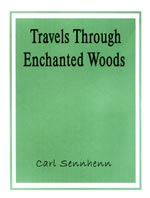 Poetry
Poetry
Travels Through Enchanted Woods
Carl Sennhenn, Village Books Press, Cheyenne, OK
Baltimore native Sennhenn has called Oklahoma home since 1951, and he “feels called to honor… the Severn and the Chesapeake of Maryland as well as the prairie and vast horizons of Oklahoma.” This third collection by Sennhenn explores life, loss, and what can be restored through language, through enchantment. He teaches English and Humanities at Rose State College in Midwest City, and has presented readings and workshops nationally and statewide. In 2001, he was appointed to a two-year term as Oklahoma Poet Laureate.
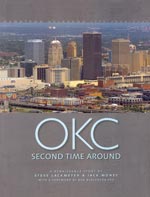 Design and Illustration
Design and Illustration
Design Winner— OKC: Second Time Around
Designed by Carl Brune, Full Circle Press, Oklahoma City, OK
Brune weaves more than 250 photos with historic plans and modern graphics to help tell the story of a downtown lost and reborn. He received the 2002 Oklahoma Book Award in Design for the Philbrook Museum of Art’s Woven Worlds: Basketry from the Clark Field Collection. The Enid native makes his home in Tulsa where he provides freelance graphic design services for publications, businesses and museums.
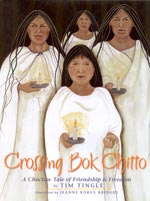 Illustration
Winner—
Illustration
Winner—
Crossing
Bok Chitto: A Choctaw Tale of Friendship and Freedom
Illustrated
by Jeanne Rorex Bridges, Cinco Puntos Press, El Paso, TX
Rorex Bridges is an award-winning artist of Cherokee ancestry. She still lives on the land in eastern Oklahoma where she was raised. Here she paints and runs her successful art business with her husband James. She has become nationally known, winning many awards in Indian art shows. For several years, she has incorporated paintings depicting the shared history of Southeastern Indians and African Americans with her Native American work, making Crossing Bok Chitto a perfect fit for her first book illustration.
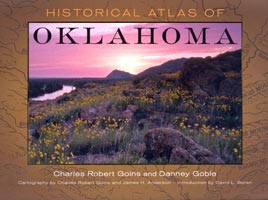 Non-Fiction
Non-Fiction
Historical Atlas of Oklahoma, Fourth Edition— Charles Robert Goins and Danney Goble, University of Oklahoma Press, Norman, OK
This isn’t just an update to a legendary reference source—it’s a complete recreation. The authors are joined by seventeen contributing scholars (including natural and physical scientists) and other professionals to present 119 topics. To explore each, one or more maps with explanatory legends, tables, and graphs are paired with an interpretive essay. The result is a work that is more valuable than ever to students of the state. Goins is Professor Emeritus in the College of Architecture of the University of Oklahoma. Goble, an OU Professor of Letters, received the Oklahoma Book Award for non-fiction in 1991 for Little Giant, the story of Carl Albert.
Children/Young Adult
Children Winner— Crossing Bok Chitto: A Choctaw Tale
of Friendship and Freedom
Tim Tingle, Cinco Puntos Press, El Paso, TX
A river called Bok Chitto cuts through Mississippi. In the days before the War Between the States, the river formed a boundary between the Choctaw lands and the plantations. If a slave escaped from the plantations and made his way across Bok Chitto, he was free. Tim Tingle is a popular presenter at storytelling and folklore festivals across America. He is especially well known for his stories about his native Choctaws. Tim was a finalist for the Oklahoma Book Award in 2004 for Walking the Choctaw Road, and the book was the second title selected for Oklahoma Reads Oklahoma.
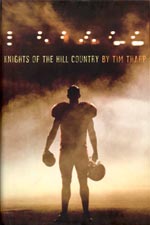 Young Adult Winner— Knights of the
Hill Country—Tim
Tharp,
Random House Children’s Books, New York, NY
Young Adult Winner— Knights of the
Hill Country—Tim
Tharp,
Random House Children’s Books, New York, NY
Welcome to Kennisaw, Oklahoma, where Friday night football ranks next to God and country and sometimes comes in first. The Kennisaw Knights are going for their fifth-straight undefeated season and if they win they will be legends. This is the story of a boy who must decide for himself the true meaning of sportsmanship and loyalty. Tharp grew up in Midwest City, home of the Bombers. He teaches in the Humanities Department at Rose State College. His first novel, Falling Dark, was awarded the Milkweed National Fiction Prize and was a finalist in the fiction category for the Oklahoma Book Awards.
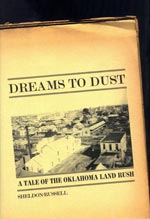 Fiction
Fiction
Dreams to Dust: A Tale of the Oklahoma Land Rush
Sheldon Russell, University of Oklahoma Press
Readers of Russell’s latest work return to the early days of Oklahoma
Territory where frontier men and women gamble everything to find their
future. In recounting the rise and fall of the jerrybuilt city of Guthrie,
the author immerses us in the lives of his characters, whose ambitions
echo the taming of the frontier. Russell grew up on a cattle ranch in
the Gloss Mountains of northwestern Oklahoma. He resides in historic
Guthrie, where he and wife Nancy, a sculptor, own and operate the Double
Starr Studio and Gallery.
Ralph Ellison Award
From time to time, the Ralph Ellison Award, honoring a deceased Oklahoma writer, is presented. The award is named after the first recipient, Ralph Ellison, author of the ground-breaking novel Invisible Man. A list of Ellison Award recipients is listed on the Previous Winners page of this program.
It is fitting that Muriel Wright be recognized in the year of Oklahoma’s Centennial. She has been acclaimed as both making and preserving the history of our state. She wrote or co-authored 12 books on Oklahoma, and from 1955 to 1973, she served as editor of The Chronicles of Oklahoma, a journal published by the Oklahoma Historical Society, shaping it into a well-regarded publication.
She described her identity as thoroughly American: one-fourth Choctaw and from distinguished colonial ancestry. She traced her genealogy to descendents aboard the Mayflower in 1620. Wright was born in Lehigh, Choctaw Nation, in 1889. Her grandfather was Allen Wright, chief of the Choctaw Nation from 1866 until 1870, and the man credited with coining the name “Oklahoma” from two Choctaw words translated as “Red People.”
Among Muriel Wright’s literary achievements is the four-volume work Oklahoma, a History of the State and its People (1929) written with Joseph Thoburn. This was and still is the most comprehensive study of the state’s history and biography. Three of her other books: The Story of Oklahoma, Our Oklahoma, and The Oklahoma History were adopted by the state textbook commission for the public schools. She also wrote A Guide to the Indian Tribes of Oklahoma and, with historian LeRoy Fischer, Civil War Sites in Oklahoma.
Upon her retirement in 1973, George Shirk, board president of the Oklahoma Historical Society, said, “The thought of the gap that would have been left in Oklahoma history, had it not been for her work, makes me shudder.”
Her awards and honors include: Oklahoma Hall of Fame, Hall of Fame of Famous American Indians, Oklahoma Historical Society Historians Hall of Fame, the University of Oklahoma Distinguished Service Citation, and an Honorary Doctorate from Oklahoma City University. She was also named Oklahoma City Woman of the Year in 1951. In 1971, Wright was named Outstanding Indian Woman of the Twentieth Century by the North American Indian Women’s Association.
Arrell Gibson Lifetime Achievement Award
The Arrell Gibson Lifetime Achievement Award is presented each year to recognize a body of work. This award was named for the Norman, Okahoma historian who served as the first president of the Oklahoma Center for the Book.
Clifton Taulbert is probably best known for his memoir Once Upon a Time When We Were Colored, about his experience of growing up in the racially charged Mississippi Delta during the civil rights movement. In his picture of tiny Glen Allen, Mississippi, Taulbert focuses more on the bonds of family and community—“the front porch people”—rather than the growing conflict between black and white. The work is also a love song to the family that nourished him and protected him from a world of hatred and segregation. Publishers Weekly described the book as a “funny, sweet, touching memoir.” Once Upon a Time When We Were Colored was made into a popular motion picture.
A second memoir, The Last Train North, continues his experiences after high school, when he left Mississippi and traveled to St. Louis for “the good life.” This book was nominated for a Pulitzer Prize. Rounding out the trilogy is Watching our Crops Come In, which covers Taulbert’s time in the United States Air Force, and a revealing return trip to his Mississippi home town.
Other non-fiction books include, Eight Habits of the Heart, The Journey Home: A Father’s Gift to His Son, and Eight Habits of the Heart for Educators.
Taulbert has also written three children’s books: Little Cliff and the Porch People, Little Cliff’s First Day of School, and Little Cliff and the Cold Place.
He also is the founder and director of the Building Community Institute located in Tulsa. A popular lecturer and motivator, he speaks throughout the world on the need to create an environment branded by respect, affirmation, and inclusion.
![]()
To see complete list of 2007 Oklahoma Book Award Finalists go here.
![]()
The Oklahoma Center for the Book, sponsor of the Oklahoma Book Award competition, is a nonprofit, 501-c-3 organization located in the Oklahoma Department of Libraries. Established in 1986 as an outreach program of the Library of Congress, the Oklahoma Center was the fourth such state center formed.
The mission of the Oklahoma Center for the Book is
![]() to promote the
work of Oklahoma authors,
to promote the
work of Oklahoma authors,
![]() to promote the
literary heritage of the state, and
to promote the
literary heritage of the state, and
![]() to encourage reading
for pleasure by Oklahomans of all ages.
to encourage reading
for pleasure by Oklahomans of all ages.
For further information about the Oklahoma Center for the Book or the Oklahoma Book Award program, contact Connie Armstrong, 200 NE 18th Street, Oklahoma City, Oklahoma, 73105; or call 1-800-522-8116 toll free, statewide. In the Oklahoma City metropolitan area, call 522-3383.
![]()
Copyright © - All Rights Reserved
Oklahoma Department of Libraries